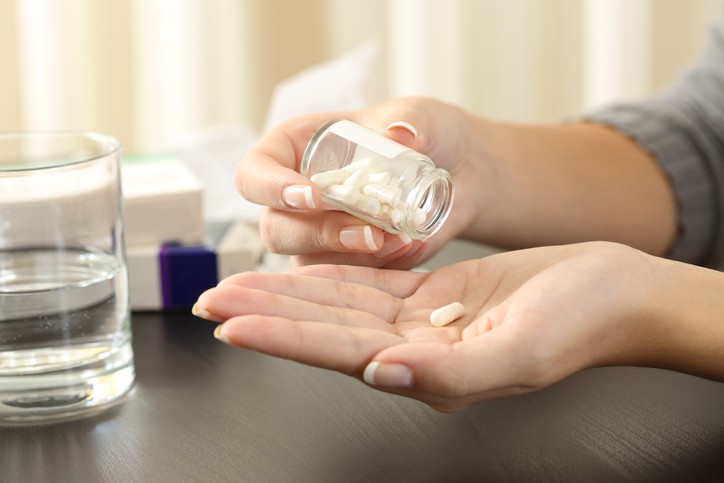 Close up of a woman taking a pill from bottle on a table
Close up of a woman taking a pill from bottle on a table
During cold, cough, and flu season, many people reach for over-the-counter medications like Tylenol for relief. Tylenol, known generically as acetaminophen, is a common pain and fever reducer found in hundreds of medications. While acetaminophen is safe when used correctly, it’s crucial to understand how often you can take it to avoid potential health risks. Every year, accidental overdoses lead to emergency room visits and, tragically, sometimes death. This often happens because people don’t realize how much acetaminophen they are consuming when combining different medications.
Understanding Acetaminophen and Safe Dosage
Acetaminophen is effective for managing pain and reducing fever. Unlike NSAIDs (nonsteroidal anti-inflammatory drugs) such as aspirin, ibuprofen (Advil, Motrin), and naproxen (Aleve), acetaminophen does not reduce inflammation. However, it is gentler on the stomach, making it a suitable option for individuals who cannot tolerate NSAIDs. It plays a vital role in managing chronic pain, especially in older adults.
The critical point to remember is that acetaminophen has a narrower safety margin compared to NSAIDs like ibuprofen. While NSAIDs also carry risks with overuse, a significantly smaller amount of acetaminophen can cause serious harm, specifically liver damage. Excessive acetaminophen intake can lead to liver failure, requiring a transplant or even resulting in death.
When you take a normal dose of acetaminophen, your body processes most of it and eliminates it through urine. However, a small portion is converted into a toxic byproduct that can harm the liver. If you take too much acetaminophen, either in a single instance or cumulatively over several days, this toxic byproduct can accumulate faster than your body can handle.
For a generally healthy adult, the maximum daily dose of acetaminophen from all sources should not exceed 4,000 milligrams (mg). However, it’s important to note that even doses approaching this 4,000 mg limit could be harmful to the liver in some individuals. For optimal safety, especially with frequent use, it is recommended to take only the necessary amount to relieve symptoms and ideally stay below 3,000 mg per day.
How to Stay Within Safe Acetaminophen Limits
If you are uncertain about the safe amount of acetaminophen for you based on factors like age, body size, or health conditions, consult your doctor or pharmacist. Here are key precautions to help you avoid accidental acetaminophen overdose:
-
Be Mindful of Combination Products: Always check the labels of over-the-counter cough, cold, and flu medications. Many of these contain acetaminophen. Be aware of all sources of acetaminophen to avoid exceeding the daily limit.
-
Check the Milligram Strength: Over-the-counter acetaminophen pills come in different strengths, such as 325 mg, 500 mg, or 650 mg. Exercise extra caution when using the higher-dose pills (500 mg and 650 mg) as they make it easier to reach the maximum daily dose quickly.
-
Adhere to Recommended Dosage: Resist the temptation to increase the recommended dose of acetaminophen. If you are smaller in stature, aim for the lower end of the recommended dosage range (closer to 3,000 mg daily).
-
Limit Alcohol Consumption: Alcohol consumption increases the liver’s production of the toxic byproduct of acetaminophen. If you are taking acetaminophen, men should limit alcohol intake to no more than two standard drinks per day, and women to no more than one.
-
Consider Medication Interactions: Discuss all your prescription medications with your doctor or pharmacist to identify any potential interactions with acetaminophen. Some medications can increase the risk of liver damage when taken with acetaminophen.
Understanding How Often You Can Take Tylenol and Dosage Frequency
The question “How Often Can I Take Tylenol?” is directly related to maintaining a safe daily dose. The frequency depends on the strength of the Tylenol pills you are taking. Here’s a guide based on different strengths:
| 325 mg | 500 mg | 650 mg Extended Release | |
|---|---|---|---|
| Take how many pills at a time? | 1 or 2 | 1 or 2 | 1 |
| Take how often? | Every 4 to 6 hours | Every 6 to 8 hours | Every 8 hours |
| Safest maximum daily dose for most adults | 8 pills | 6 pills | 4 pills |
| Never exceed in 24 hours | 12 pills (3900 mg) | 8 pills (4000 mg) | 6 pills (3900 mg) |
It’s always best to use the lowest effective dose of acetaminophen and aim to stay closer to 3,000 mg as your maximum daily intake. If you require high doses of acetaminophen for chronic pain management, it is essential to consult your doctor to determine the safest approach for your situation.
While tens of thousands of people experience illness each year due to excessive acetaminophen intake, and a smaller number tragically die, these incidents are often preventable. By carefully reading medication labels, understanding the acetaminophen content, and adhering to recommended dosage guidelines, you can use Tylenol safely and effectively.
For more comprehensive strategies for pain management beyond medication, explore resources like the Harvard Special Health Report Pain Relief Without Drugs or Surgery.
Image: AntonioGuillem/Getty Images
About the Reviewer
Howard E. LeWine, MD, Chief Medical Editor, Harvard Health Publishing; Editorial Advisory Board Member, Harvard Health Publishing
Dr. Howard LeWine is an actively practicing internist at Brigham and Women’s Hospital in Boston and serves as the Chief Medical Editor at Harvard Health Publishing. He is also the Editor in Chief of Harvard Men’s Health Watch. See Full Bio
View all posts by Howard E. LeWine, MD
Disclaimer:
This article is intended for informational purposes and does not constitute medical advice. Always consult with a qualified healthcare professional for any health concerns or before making any decisions related to your health or treatment. Never disregard professional medical advice or delay seeking it because of something you have read in this article.
